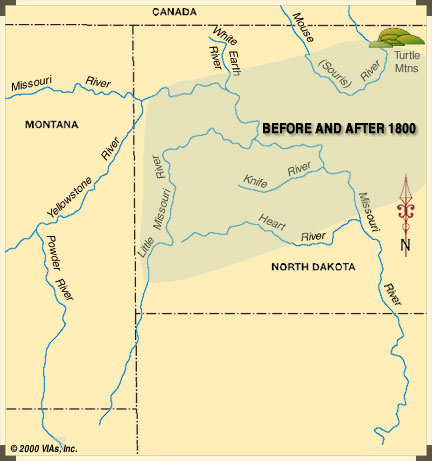The expedition reaches the Great Bend of the Missouri where the river turns west in present North Dakota. They see fertile, treeless plains, a bluff with burning lignite coal, and catch up to three French trappers who had left the Knife River Villages a few days before them.
In 1803, the Hidatsa were using a vast area vaguely defined by the Mouse (Souris) River on the north, the Turtle River on the east near today’s border with Minnesota, the Heart River on the south, and the Yellowstone River on the west.
Barren, Fertile Plains
The country on both sides of the missouri from the tops of the river hills, is one continued level fertile plain as far as the eye can reach, in which there is not even a solitary tree or shrub to be seen except such as from their moist situations or the steep declivities of hills are sheltered from the ravages of the fire.
—Meriwether Lewis
Clark’s Walk on Shore
this day proved to be verry worm, the Misquetors troublesom. I Saw Several Antilope on the S. S. also gees & Swan
—William Clark
Bluff on Fire
the bluff is now on fire and throws out considerable quantities of smoke which has a strong sulphurious smell.
—Meriwether Lewis
Three French Trappers
at 1 P.M. we overtook three french hunters who had set out a few days before us with a view of traping beaver; they had taken 12 since they left Fort Mandan. this is the first essay of a beaver hunter of any discription on this river. the beaver these people have already taken is by far the best I have ever seen.
—Meriwether Lewisthey Gave us the tails and Some of the meat which eat verry Good;
—John Ordway
Great Bend of the Missouri
we camped on the S. S. just above a remarkable bend in the river to the S W, which we call the little bason.
—William Clark
Weather Diary
State of Thermometer at rise
Weather Wind at rise
State of Thermometer at 4 P.M. Weather Wind at 4 P.M. State of the River 42 [above 0] fair E 74 [above 0] fair S W. raised 1/8 in. the prarie lark, bald Eagle, & the large plover have returned. the grass begins to spring, and the leaf buds of the willow to appear.— Chery birds disappear.
—William Clark and Meriwether Lewis[1]To assist the reader, the editor of this web page has omitted the date column, clarified the “State of the River” information, and spelled out some abbreviations.
Experience the Lewis and Clark Trail
The Lewis and Clark Trail Experience—our sister site at lewisandclark.travel—connects the world to people and places on the Lewis and Clark Trail.
Plan a trip related to April 10, 1805:

Notes
| ↑1 | To assist the reader, the editor of this web page has omitted the date column, clarified the “State of the River” information, and spelled out some abbreviations. |
|---|

